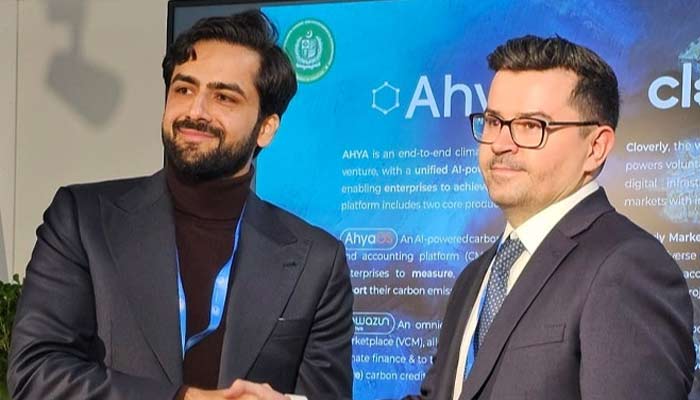
Salaal Hasan, the CEO of Ahya, has emerged as a decided participant on the twenty ninth Convention of the Events (COP29) in Baku the place nations from all over the world have gathered to debate the pressing want to deal with local weather change by way of revolutionary insurance policies and collaborative motion.
This collaborative motion, which has been pressured by the world on the world discussion board, is obvious in Pakistan’s involvement in regional and world initiatives corresponding to Ahya’s Tawazun Market, spearheaded by Hasan.
Arriving on the COP29 with a singular profile and impressive plans for the event of a strong carbon market to draw inexperienced investments, Hasan introduced that Tawazun has partnered with Cloverly, a number one United States-based digital infrastructure for the carbon markets.
This partnership seeks to bridge the hole between Center Japanese initiatives and worldwide consumers, opening new avenues for sustainability, innovation, and financial progress within the area.
This got here days after Pakistan launched a Carbon Market Coverage which positions the nation as a creating nation with a lot potential for lowering their emissions.
“Our focus has all the time been on accessibility and sustainability,” Hasan advised Forbes journal quickly after making the announcement.
Nevertheless, Hasan additionally revealed the dangers that buyers could face in a rustic like Pakistan that’s battling with extreme challenges on the local weather entrance.
“Carbon markets have danger ranking mechanisms which accompany requirements,” Hasan advised Geo.television.
“Voluntary carbon markets have requirements set by personal sector our bodies corresponding to Verra, Gold Commonplace or Puro Earth. And danger scores corresponding to Calyx World, BeZero or Sylvera. Proper now, most of those requirements are the US or EU’s.
“The Center East and Pakistan have to develop their very own customary setting our bodies and danger ranking companies.”
The newly finalised carbon market coverage, which was showcased throughout a high-profile occasion at COP29, is ready to be applied quickly as it’s at present ready to be authorised subsequent month.
Coordinated by the prime minister’s Local weather Change Coordinator Romina Khurshid Alam, the coverage goals to ascertain a regulatory framework to draw inexperienced investments and propel the nation towards a low-carbon economic system.
The coverage underscores Pakistan’s dedication to the Paris Settlement and its readiness to collaborate with each the personal sector and worldwide companions.
Alam emphasised the significance of partnerships in creating sturdy carbon markets, inviting stakeholders to co-create alternatives that foster sustainable funding.
Hasan stated that when Pakistani initiatives are developed, these requirements and scores all the time charge the nation low resulting from social political and financial elements.
“The opposite dangers come from brokers and middlemen, which trigger fragmentation and cost hefty upfront prices with out transparency,” stated Hasan.
“The final is overseas trade. Right here, carbon registries play a pivotal position in making certain that funding come into the nation and never exit,” he added.
Moreover, when requested if he believed Pakistan’s progress targets and its aspiration to change into a tech vacation spot (with extra energy-consuming knowledge centres) could impede its means to maintain carbon market initiatives, he suggested to take a conservative strategy.
The local weather skilled revealed that Pakistan has a Nationally Decided Contributions (NDC) goal of fifty% BaU, which is modelled on an 8.5% gross home product (GDP) progress charge.
“Our economic system has by no means grown at 8.5% in our lifetime,” he defined to Geo.television, including that whereas such an element could also be “good for principle”, it’s higher to be conservative on the subject of forming a trajectory.
“The MoCC (Ministry of Local weather Change), which is the nationally-designated authority, should revise our NDC’s to a extra conservative progress charge,” he suggested.
The local weather skilled additionally emphasised that it’s usually repeated by our leaders that we account for 1% of world emissions.
“That’s as a result of our GDP shouldn’t be that top in comparison with our populous and our final nationwide GHG stock was accomplished greater than 5 years in the past on proxies (it may be much more correct utilizing precise exercise knowledge as per the GHG protocol),” stated Hasan.
“Pakistan’s actual difficulty is emissions depth, or quantity of emissions per GDP primarily pushed by inefficiencies in personal sector enterprise,” stated Hasan.
“This is because of our excessive dependence on fossil fuels (which we weren’t utilizing within the 90’s) for assembly our energy calls for (primarily coal energy initiatives) in addition to for fuelling our logistics sectors.”
Concluding his ideas on the matter, Hasan suggested that, for Pakistan to transition to internet zero and meet its NDC commitments, we should:
- Concentrate on a renewable power transition and the federal government should incentivise the personal sector to take part;
- Concentrate on actual time knowledge from the personal sector and produce ahead rules for greenhouse gasoline emissions within the air from business agri and thru automobiles;
- Incentivise challenge builders in voluntary and compliance markets and use know-how for driving transparency in each consistent with articles 4, 5, 6, and 10 of the Paris Settlement.
